Cars
A review of China's auto industry
(China Daily)
Updated: 2010-12-27 15:23
 |
Large Medium Small |
Another torrid market, yet year draws to end on an ominous note
Editor's note: It was a year of record sales and the biggest-ever Chinese acquisition of a foreign automaker, but as 2010 drew to a close, the Beijing municipal government moved to drastically reduce the number of new cars sold in the city in 2011. China Daily auto writers Gong Zhengzheng and Han Tianyang report on what made news in the last 12 months.
Capital cuts new cars
|
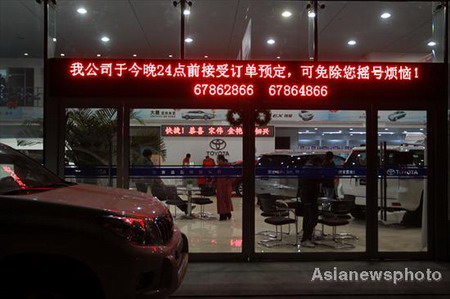 |
|
Advertisement above a Beijing car sales and service shop open late into the night of Dec 23 warns that city government restrictions on new car registration will take effect the following day. Just 240,000 new cars will be allowed in 2011 due to rising traffic congestion in the capital. [Photo / Asianewsphoto] |
The Beijing municipal government on Dec 23 released new measures to sharply reduce new vehicle registration in a move to ease worsening traffic congestion in the city.
Only 240,000 vehicles will be registered next year in Beijing, in comparison with more than 800,000 cars sold in the capital city this year.
Analysts said that auto market in the whole country will be affected if other medium and large cities follow Beijing and implement similar rules.
Another factor to impact the market is expiry of the nation's tax rebate next year.
Anticipating the new policy, Beijing citizens rushed to buy cars and apply for license plates in the past few days.
Local press reported that a record high of 9,000 vehicles were registered on a single day on Dec 23, bringing the total number of vehicles registered in Beijing to 4.8 million.
Related readings: Anticipated limit on license plates fuels car-buying frenzy
Anticipated limit on license plates fuels car-buying frenzy Beijing's plan to steer clear of traffic jams
Beijing's plan to steer clear of traffic jams Beijing unveils measures to ease traffic flow
Beijing unveils measures to ease traffic flow Beijing traffic seizes up under rising pressure
Beijing traffic seizes up under rising pressure
Fast lane
|
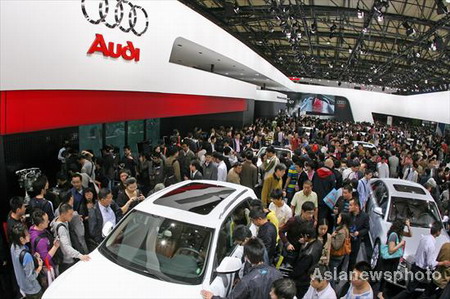 |
|
Crowds at Audi's exhibition booth at an auto show. The luxury leader sold its 1 millionth vehicle in China in October. [Photo / Asianewsphoto] |
According to the China Association of Automobile Manufacturers, both production and sales hit 16.4 million units in the first 11 months, surging 33.7 percent and 34.1 percent from a year ago.
Full-year production and sales will both exceed 18 million units, maintaining China's crown of the world's top vehicle producer and market.
Related readings: China to sell 17m vehicles in 2010
China to sell 17m vehicles in 2010 China not to extend auto incentives next year -paper
China not to extend auto incentives next year -paper China to promote auto imports in next 5 yrs
China to promote auto imports in next 5 yrs Rules may steer auto sector out
Rules may steer auto sector out
New-energy fever
|
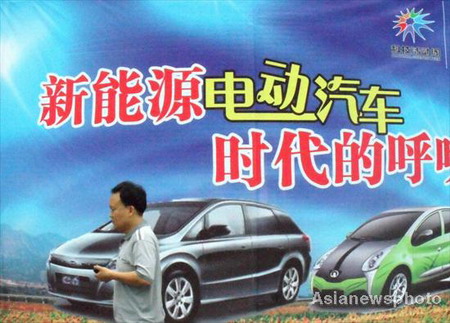 |
|
Billboard promoting new energy vehicles. [Photo / Asianewsphoto] |
The companies include Volkswagen, BMW, Nissan, Honda and Toyota as well as homegrown brands Chery, Geely, BYD and SAIC. Volkswagen, the biggest passenger car provider in China, announced that it will build its Golf and Lavida blue-e-motion electric cars at its two joint ventures in China between 2013 and 2014.
Governments at various levels are also backing the development of hybrid and electric vehicles. Owners of purely electric cars in five pilot cities - Shanghai, Changchun, Shenzhen, Hangzhou and Hefei - have been eligible for a subsidy of 60,000 yuan since June this year. Owners of plug-in hybrid cars can receive up to 50,000 yuan.
Related readings: New-energy car strategy proposed
New-energy car strategy proposed China's chance to lead in 'green cars'
China's chance to lead in 'green cars' Alliance drives promotion of electric cars
Alliance drives promotion of electric cars China's EV industry leaps forward
China's EV industry leaps forward
Geely's Volvo buyout
|
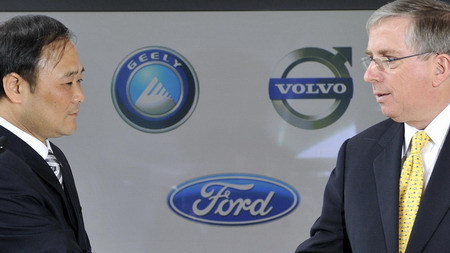 |
|
Chairman of Zhejiang Geely Holding Group Li Shufu hugs Ford's Chief Financial Officer Lewis Booth attend the signing ceremony on March 28, 2010. [Photo / Xinhua] |
Geely then named Stefan Jacoby, former CEO of Volkswagen Group in America, the new chief of Volvo.
The new Volvo board is headed by Geely Chairman Li Shufu and has several new directors including Volvo's former president and chief executive Hans-Olov Olsson as vice-chairman.
Geely has also reshuffled Volvo's China management. Volvo retains its headquarters and manufacturing presence in Sweden and Belgium. Its management has the autonomy to execute its business plan under strategic direction from the board.
Related readings: Focus on Geely's purchase of Volvo
Focus on Geely's purchase of Volvo Geely to build 3 plants to make Volvos
Geely to build 3 plants to make Volvos The brand journey of Geely and Volvo
The brand journey of Geely and Volvo Geely-Volvo deal helps China go global
Geely-Volvo deal helps China go global
Luxury boom
|
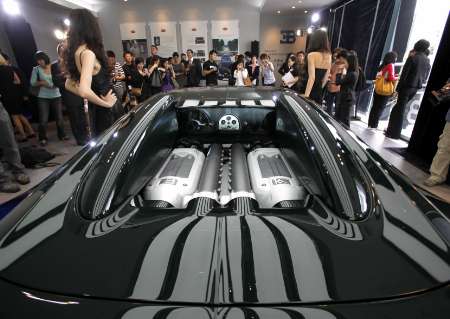 |
|
Two models stand next to a new Bugatti concept car during the official opening of the world's first Bugatti showroom in central Beijing September 23, 2009. [Photo / Reuters] |
The company, which is the first foreign luxury carmaker produce in China, has revealed an aggressive plan to move another 1 million vehicles in China over the next three years.
Audi produces the A6 and A4 sedans as well as the Q5 SUV at a joint venture with its parent Volkswagen Group and China's FAW Corp.
In the first 11 months of this year, Audi's China's sales topped 200,000 units, maintaining its two-decade reign in the country's luxury car market. Arch-rivals BMW and Mercedes-Benz also posted blistering sales growth in China this year.
Related readings: 2010 Beijing Auto Show
2010 Beijing Auto Show Premium brands luxuriate in China's new wealth
Premium brands luxuriate in China's new wealth Luxury brands target Chinese shoppers
Luxury brands target Chinese shoppers Luxury car sales roll at auto show
Luxury car sales roll at auto show Shortage drives up luxury car surcharges
Shortage drives up luxury car surcharges
Toyota's apology
|
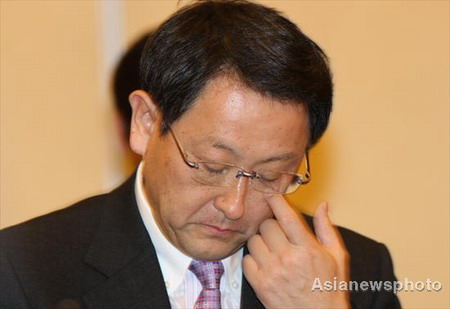 |
|
Akio Toyoda [Photo / Asianewsphoto] |
In China, the company recalled 75,500 RAV4 SUVs made at its joint venture plant in Tianjin due to defective brake pedals, a tiny ratio of its global recall of nearly 8.5 million vehicles because of similar problems.
"The incident caused worries to Chinese consumers. I hereby express my sincere apologies for these worries," Toyoda said at the press conference.
He blamed the problems mainly on the carmaker's overly rapid expansion. While he made a similar apology in Washington, the company faces far more serious sanctions in the US.
According to China's current regulations, vehicle producers that try to cover up defective products can be fined a maximum of 300,000 yuan, a negligible punishment compared with what they face in Western markets.

Related readings: Toyota chief says 'sorry' to Chinese consumers for recalls
Toyota chief says 'sorry' to Chinese consumers for recalls Toyota chief blasted by lawmakers despite apology
Toyota chief blasted by lawmakers despite apology Toyota to recall 134,234 autos in China due to flawed design
Toyota to recall 134,234 autos in China due to flawed design Toyota to improve quality for China market
Toyota to improve quality for China market
Guangzhou Auto listed
|
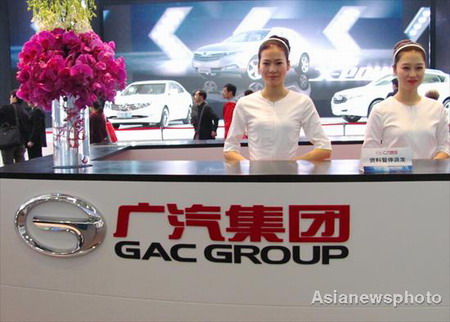 |
|
The GAC display area at the 2010 Beijing Auto Show. [Photo / Asianewsphoto] |
Guangzhou Auto - the partner of Honda, Toyota and Fiat - is also expected to float shares in Shanghai next year.
During the Guangzhou auto show set to close today, the company announced it plans to hike its annual production capacity to 3 million vehicles by 2015, up from less than 1 million this year.
FAW Corp, Chery, Lifan and Beijing Automobile Industry Holdings Corp are also preparing for stock listings. SAIC Motor Co Ltd, China's top auto group, went public in a Shanghai listing in 2006. Dongfeng Motor Group Co Ltd, the No 3 automaker, floated shares in Hong Kong in 2005.
Related readings: Guangzhou Auto triples profit
Guangzhou Auto triples profit Guangzhou Auto aims for HK listing by end July
Guangzhou Auto aims for HK listing by end July HK float for Guangzhou Auto
HK float for Guangzhou Auto Guangzhou Automobile offers to buy out Denway investors
Guangzhou Automobile offers to buy out Denway investors
Peugeot's new liaison
|
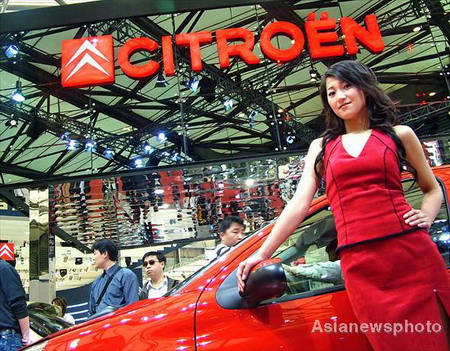 |
|
A model stands by a Citroen car in the 2007 Shanghai Auto Show. [Photo / Asianewsphoto] |
The move made the French company the latest major foreign carmaker with second partner in China as well as Volkswagen, Toyota and Honda.
The move came amid PSA Peugeot Citroen's unsuccessful 25-year partnership with Dongfeng Motor Corp.
The French carmaker's new joint venture with Chang'an will have a production capacity of 200,000 cars and 200,000 engines in the initial stage. The new association in China will pose a big challenge to PSA Peugeot Citroen on how to balance relations between two different major partners.
Related readings: Peugeot Citroen looks to new liaison
Peugeot Citroen looks to new liaison Peugeot sees China driving its brand
Peugeot sees China driving its brand Peugeot plans for smoother ride
Peugeot plans for smoother ride Peugeot-Citroen mulls JV with Chang'an Auto
Peugeot-Citroen mulls JV with Chang'an Auto